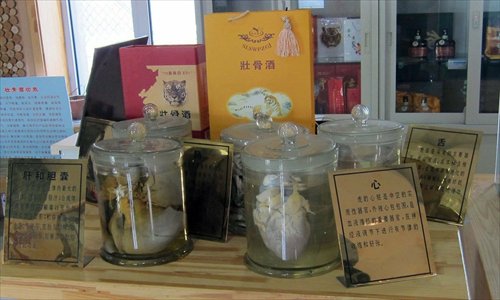Legalization of tiger product trade slammed by environmentalists

A group of Siberian tigers chew on chicken bones in the Harbin Siberian Tiger Forest Park. Photo: IC

Tiger organs (not for sale) and bone wine (for sale) are displayed in the gift shop of the Harbin Siberian Tiger Forest Park, Northeast China's Heilongjiang Province in 2014. Photo: IC
Friday marks the International Tiger Day, just days after two big cats at a Beijing safari park attacked two women, killing one.
China's newly amended law on wild animal protection, approved this year, has been controversial as it allows the limited commercial exploitation of tigers, which are sought after by the traditional Chinese medicine industry due to their supposed medicinal properties.
Beyond cruelty
On July 23, tigers at Beijing Badaling Safari Park attacked two passengers who got out of their car while driving through the tiger enclosure. This has sparked heated discussion online, with some criticizing them for breaking the rules and some accusing the park of lax management.
Park staff told Global Times on Wednesday that the incident is still under investigation and the two tigers were not "executed."
"Many of these safari parks in China should be banned because they train tigers in a cruel way to entertain visitors or sell tiger products," Mang Ping, a professor from the Central Institute of Socialism and a founder of the Zoo Watch animal protection NGO, told the Global Times.
But the treatment tigers face in captivity goes beyond just cruelty.
Xionglin Xionghu Villa of Guilin, a safari park and baijiu company based in Guilin, the Guangxi Zhuang Autonomous Region is allegedly the world's biggest breeding base for tigers.
On its website, there are various types of baijiu with "medicinal properties made from the bones of a rare species animals" for sale. They do not say what animals are used.
"We sell baijiu made of our own animals," a staff member told the Global Times on Wednesday.
He said the bones come "from the animal's dead body of course. It's illegal to kill tigers and we have to keep feeding them until they die."
According to news portal chinanews.com, between 2009 November to 2010 February, 11 Siberian tigers died "abnormally" in the Shenyang Forest Zoological Garden, leading to an official investigation. The government concluded that the tigers were not given enough food.
The Dahe Daily reported in 2008 that some 100 tigers disappeared from a safari park in Yichang, Central China's Hubei Province, which was sponsored by the Villa of Guilin. The owner of the safari park was then detained after an official investigation.
News site china.com reported in March that a Guangxi safari park had starved its tigers to death to use their bones for baijiu.
In 2007, articles published in the China Journal of Traditional Chinese Medicine and Pharmacy pushed for the approval of tiger-based medicines to "reduce human being's pain."
'Already dead'
China banned the trade and use of products made from tigers in 1993.
However, in the revised version of China's Wild Animal Protection Law which was approved on July 2 and will be put into effect in 2017, some animal populations, bred under controlled conditions with "mature" technology, can be regulated differently from wild populations and used to make commercial products, the Xinhua News Agency reported.
Li Fei, a member of the Standing Committee of China's 12th National People's Congress (NPC) said in April that certain breeding bases already have the technology to breed tigers.
"Since they are already dead, we should use them," Li said, according to the Beijing Youth Daily.
"How can you define what techniques are mature? It's just a gesture to legalize trading in (rare) animal products," said Mang.
China had 200 tiger breeding bases in 2013 which have altogether raised some 6,000 tigers, according to a document issued by the Environmental Investigation Agency, a UK-based environmental organization.
Mang said as tigers can be bred very quickly safari parks often end up with more than they knew what to do with.
So they started making products from tigers in the 1990s as at that time there were few regulations about this practice, said Mang.
According to a 2014 Nanfang Daily report, at the time tiger bones were sold for 14,000 yuan ($2,254) per kilogram, and tiger bone baijiu was sold 1,000 yuan per kilogram.
In 2005, the State Foresty Administration and State Administration for Industry & Commerce jointly issued a statement which said that tigers must be registered, legal.cn reported.
"But companies will wait until the tiger is six months old to register it, as many tigers die at a younger age due to inbreeding and some are sold as cubs," said Hu Chunmei, secretary general of Endangered Species Fund of China Biodiversity Conservation and Green Development Foundation.
Newspaper headline: Make no bones